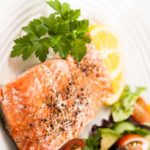SCIENCE BASED NUTRITION FOR ALL OF US
BY CEO ROBERT FORSTER, PT
Just like with your training, a science-based approach to what you put in your body and when you do it has a great effect on your ability to achieve your athletic and health goals. My approach to health and fitness involves guided exercise and an easy-to-follow, “close-to-the- earth” diet. Both are designed for one singular goal: metabolic efficiency—to make you a better butter burner. We have discussed the importance of precision heart rate training to develop your fat-burning metabolism in in the past and now it’s time to dial in your diet to further serve this goal. All of us, especially athletes, need to alter our relationship with food. We need to view daily nutrition as the source of our life energy and focus on foods that further health, not disease. In recent decades, we’ve been told more about what not to eat than what to eat to stay healthy. Slowly, our relationship with food is changing as our food supply is being exposed as corrupted and unnatural. We are realizing that we need natural foods to help keep us healthy and make us stronger, leaner, and more resistant to disease. Fact: the giant food corporations have processed most foods in the grocery store to such a degree that they have little nutritional resemblance to their root food sources. Based on extensive and costly research from farming to processing to packaging, the food industries try to get us hooked with appearance and addictive combinations of salt, sugar, and fat. Natural nutritional integrity be damned! What’s worse is that medical and health experts have unintentionally played into the “laboratory-food-is-better-than-nature” syndrome by incorrectly tarring eggs, butter, and other healthy foods as health killers. Our knowledge of food and diet is rapidly growing and changing. Some of the old rules that were long accepted as gospel have been turned on their head in recent years, such as “carbo-loading” — ingesting a great pile of carbohydrates the night before a big workout or an event to “pack” the muscles with glycogen fuel. It has long been a tradition in the endurance world. But it’s wrong. Here’s the correct eating strategy:1. Avoid processed carbs
They prevent use of fats, spike insulin, and cause inflammation. Processed carbohydrates include bread, pasta, rice, crackers, baked goods, and other sweets. Processed carbs are dangerous for three reasons:- Carbs stop fat use. Carbohydrates in your diet are counterproductive in your effort to improve fat utilization. If you put carbs in your tank, your body will reach for them as fuel before it reaches for fat to make energy for workouts and daily living.
- Carbs spike your insulin and put you to sleep. Example: If you eat a big bowl of pasta, the large insulin spike opens the cell windows and transports the carbs into the cells quickly, removing them from the bloodstream. That makes you sleepy or causes you to crave a sugar fix or caffeine to pick you up.
- Carbs create inflammation in the gut, keeping you chronically inflamed and bloated. Inflammation in the body produces excessive cholesterol. You will learn that saturated fat is not killing us; it’s the carbohydrates that do that.
2. Don’t eat carbs alone
Dilute and delay the quick absorption of processed carbs and sugars by always eating them with a protein—such as peanut butter on rice crackers. Eat fruit only after meals containing protein. This mixture is one reason why the Mediterranean diet is so effective: It includes combinations of carbs and protein eaten together.3. Don’t fear fat—love it
Recent research has exposed the big lie propagated by medical and nutritional science over the last 50 years: that dietary fat is making us fat, ruining our heart and blood vessels, and destroying our health. In fact, the opposite is true. Processed whole grains, the very food that we’ve been told are at the core of a healthy diet, is what is killing us. Fat is far from the widow maker and heart-attack-waiting-to-happen that it’s been made out to be for the past 40 years. It’s an essential nutrient and a valuable fuel for athletes who have trained their bodies to burn it. This view is increasingly supported by research and many people in the know, the latest being an esteemed cardiologist writing in the October 22, 2013, edition of the BMJ (formerly the British Medical Journal). Aseem Malhotra, MD a British interventional cardiology specialist at Croydon University Hospital in London, wrote, “Let’s bust the myth of saturated fat’s role in heart disease.” He says statistics suggest that decades of swearing off red meat, whole milk, and eggs has not only failed to reduce heart disease, but has “paradoxically increased our cardiovascular risks and that the real culprit are the sugars and processed carbs.”4. Don’t skip breakfast
Overnight, your metabolism goes down to idle, burning relatively few calories. When you wake up, you must jack up your metabolism with breakfast and start your engine burning calories right away. This will help you become leaner and perform better.5. Follow the 2-hour rule
Eat every 2 hours. If you don’t eat from breakfast until lunch, your insulin levels die down and so does your calorie burn. Between meals eat a balanced snack of 100 to 200 calories to keep insulin levels stable, which will prevent you from overeating at your next meal. Good choices include nuts, seeds, cottage cheese, tuna in oil, or yogurt. Never eat carbs alone for a snack. Break out the healthy snacks at 10 a.m., 2 p.m., and 2 hours after dinner.6. Periodize your diet
To maximize the effect of each training phase, you must alter the mix of nutrients to match your nutrition to the physiological demands of your workouts. Your daily meals and snacks and your post-workout recovery nutrition will vary as you progress through each phase of the Periodization schedule.COMPREHENSIVE SUSTAINABLE WEIGHT MANAGEMENT
PHASE IV Health & Scientific Performance Center is dedicated to improving the health and lifestyle of people of all ages and abilities with results driven science based weight loss and management programs.
Our philosophy and expertise is rooted in science. We utilize scientific evaluation techniques, state-of-the-science training protocols, and proven nutritional guidance to provide sustainable weight management solutions based on facts, not opinions or fads. Over the past 35 years we have provided comprehensive nutrition and fitness plans to the world’s most accomplished athletes; and we apply the same scientific principles to create an individualized program of exercise and diet to empower you to lose unwanted pounds, play in the yard with your grandkids, run that marathon you always wanted, qualify for the Ironman World Championships, become a scratch golfer, or manage your health risks.
No matter your age, abilities or goals, PHASE IV is dedicated to helping you acquire the healthy lifestyle you’ve always desired. Your personal weight goals and ideal performance is realized by unlocking the mysteries of your personal physiology, and finding your optimum fat burning exercise zones.
The perfect balance of training and exercise, recovery, and nutrition, is science. Science-based heart rate training zone prescriptions are based on your metabolic testing results. Using your testing results, we will design a weight management program for you based specifically on your own uniquely personal physiology, genetics and metabolism.
Your dietary intake will be analyzed for macro and micronutrient content. Deficiencies and excesses in your diet and exercise will be identified. You will receive personalized daily dietary guidelines specific to your needs based on your activity level, and a PHASE IV Nutritionist will review your progress and make necessary adjustments to your program.
LEARN MORE







